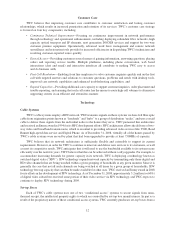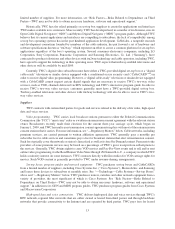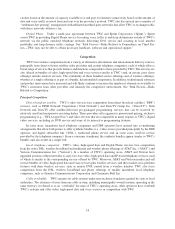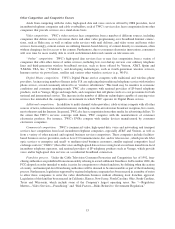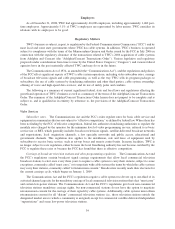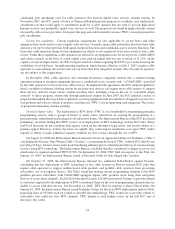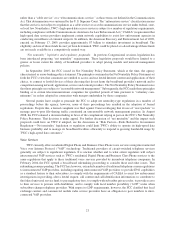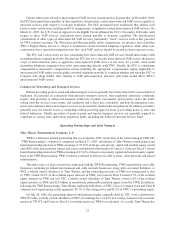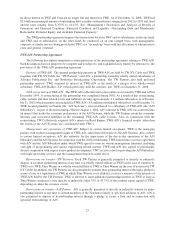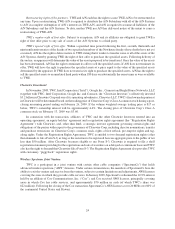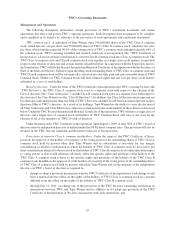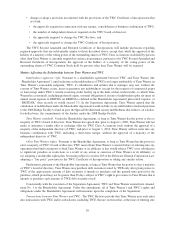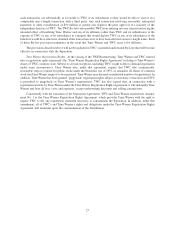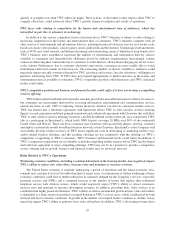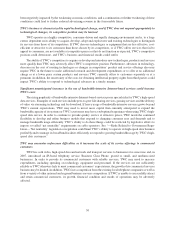Time Warner Cable 2008 Annual Report Download - page 31
Download and view the complete annual report
Please find page 31 of the 2008 Time Warner Cable annual report below. You can navigate through the pages in the report by either clicking on the pages listed below, or by using the keyword search tool below to find specific information within the annual report.rather than a “cable service” or a “telecommunications service,” as those terms are defined in the Communications
Act. That determination was sustained by the U.S. Supreme Court. The “information service” classification means
that the service is not subject to regulation as a cable service or as a telecommunications service under federal, state,
or local law. Nonetheless, TWC’s high-speed data access service is subject to a number of regulatory requirements,
including compliance with the Communications Assistance for Law Enforcement Act (“CALEA”) requirement that
high-speed data service providers implement certain network capabilities to assist law enforcement agencies in
conducting surveillance of criminal suspects. In addition, the American Recovery and Reinvestment Act of 2009,
enacted on February 17, 2009, provides approximately $7 billion to stimulate investment in broadband. The
eligibility and use of these funds has not yet been determined. TWC could be placed at a disadvantage if these funds
are not made available in a competitively neutral way.
“Net neutrality” legislative and regulatory proposals. In previous Congressional sessions, legislation has
been introduced proposing “net neutrality” requirements. These legislative proposals would have limited to a
greater or lesser extent the ability of broadband providers to adopt pricing models and network management
policies.
In September 2005, the FCC issued its Net Neutrality Policy Statement, which at the time, the agency
characterized as a non-binding policy statement. The principles contained in the Net Neutrality Policy Statement set
forth the FCC’s view that consumers are entitled to access and use lawful Internet content and applications of their
choice, to connect to lawful devices of their choosing that do not harm the broadband provider’s network and to
competition among network, application, service and content providers. The Net Neutrality Policy Statement notes
that these principles are subject to “reasonable network management.” Subsequently, the FCC made these principles
binding as to certain telecommunications companies for specified periods of time pursuant to “voluntary com-
mitments” in orders adopted in connection with mergers undertaken by those companies.
Several parties have sought to persuade the FCC to adopt net neutrality-type regulations in a number of
proceedings before the agency; however, none of these proceedings has resulted in the adoption of formal
regulations. Despite this, a formal complaint was filed against Comcast alleging that its use of “reset packets” to
manage peer-to-peer file-sharing traffic constituted an unreasonable network management practice. In August
2008, the FCC released a decision finding in favor of the complainant relying in part on the FCC’s Net Neutrality
Policy Statement. That decision is under appeal. For further discussion of “net neutrality” and the impact such
proposals could have on TWC if adopted, see the discussion in “Risk Factors—Risks Related to Government
Regulation—‘Net neutrality’ legislation or regulation could limit TWC’s ability to operate its high-speed data
business profitably and to manage its broadband facilities efficiently to respond to growing bandwidth usage by
TWC’s high-speed data customers.”
Voice Services
TWC currently offers residential Digital Phone and Business Class Phone voice services using interconnected
Voice over Internet Protocol (“VoIP”) technology. Traditional providers of circuit-switched telephone services
generally are subject to significant regulation. It is unclear whether and to what extent regulators will subject
interconnected VoIP services such as TWC’s residential Digital Phone and Business Class Phone services to the
same regulations that apply to these traditional voice services provided by incumbent telephone companies. In
February 2004, the FCC opened a broad-based rulemaking proceeding to consider these and other issues. That
rulemaking remains pending. The FCC has, however, extended a number of traditional telephone carrier regulations
to interconnected VoIP providers, including requiring interconnected VoIP providers: to provide E911 capabilities
as a standard feature to their subscribers; to comply with the requirements of CALEA to assist law enforcement
investigations in providing, after a lawful request, call content and call identification information; to contribute to
the federal universal service fund; to pay regulatory fees; to comply with subscriber privacy rules; to provide access
to their services to persons with disabilities; and to comply with local number portability (“LNP”) rules when
subscribers change telephone providers. With respect to LNP requirements, however, the FCC clarified that local
exchange carriers and commercial mobile radio service providers have an obligation to port numbers to inter-
connected VoIP providers.
21



